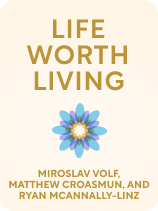

This article is an excerpt from the Shortform book guide to "Life Worth Living" by Miroslav Volf, Matthew Croasmun, and Ryan McAnnally-Linz. Shortform has the world's best summaries and analyses of books you should be reading.
Like this article? Sign up for a free trial here.
What is a life philosophy? Do you have one? Should you?
In Life Worth Living, Miroslav Volf, Matthew Croasmun, and Ryan McAnnally-Linz define the notion of a life philosophy. Then, they explain why you should have a life philosophy by exploring the value it can bring to your life.
Read more to learn what a life philosophy is and why it’s important to have one.
What Is a Life Philosophy?
What is a life philosophy? The authors argue that your life philosophy encompasses all of your beliefs about what it means to live well (for example, your beliefs about which morals are worth adhering to and the existential reasons for life on earth). Life philosophies are often inspired by transformative experiences like the loss of a loved one or exposure to radical ideas, which prompt you to discover your most authentic values and ideals through contemplation. But your life philosophy is never permanent—you can think of it like a living document that outlines your vision of what it means to live well, which should be updated as you learn and grow throughout life.
(Shortform note: Why should you think of your life philosophy as a living document? In Life Is in the Transitions, Bruce Feiler explains that most people experience what he calls “lifequakes” —the transformative experiences Volf, Croasmun, and McAnnally-Linz refer to—three to five times in life. Lifequakes can be difficult to endure because they defy your fundamental expectations about life—something radically changes and suddenly, your life philosophy doesn’t make sense. To cope with lifequakes in a healthy way, Feiler says you must “transition,” or, update your life philosophy so that it adequately reflects and accounts for your new reality. Since updating your life philosophy is inevitable, it’s best to think flexibly about it from the start.)
Why You Should Have a Life Philosophy
According to Volf, Croasmun, and McAnnally-Linz, many people live unintentionally; instead of thinking deeply about the best way to live, they act on their first instincts and assume they’re making the right choices. In the US, these instincts are informed by a common-sense vision of what it means to live well—a vision of a life that’s “happy, healthy, and long.”
(Shortform note: Why does it matter whether you live intentionally or unintentionally? Research suggests that people who tend to act on their first instincts take unnecessary risks and make more regrettable decisions, which can have negative impacts on their health and happiness. On the other hand, people who tend to act with forethought experience enhanced safety, health, and success. Altogether, this suggests that living intentionally may improve your life.)
The authors explain that there are three reasons to doubt this cookie-cutter life philosophy, stop living unintentionally, and come up with your own life philosophy. First, many admirable people—people we generally believe to have lived well—don’t achieve health, happiness, or longevity. For example, the physicist Albert Einstein struggled with chronic illness, Mother Teresa struggled with depression, and President John F. Kennedy died at the age of 46. Nevertheless, most people would agree that they lived well. This suggests that living well requires more than just those three qualities.
(Shortform note: Some research indicates that beyond health, happiness, and longevity, many people rank “psychological richness” high on the list of standards they must meet to live well. A psychologically rich life is one that’s full of diverse, fascinating, and transformative experiences. It may not even matter whether these experiences are positive or negative; researchers theorize that they enhance life either way because they keep things interesting and result in greater wisdom. Miroslav, Croasmun, and McAnnally-Linz don’t mention psychological richness by name, but coming up with your own life philosophy may count as an enriching experience because it has the potential to transform your life in major ways.)
Second, you’re accountable for living well. You might already believe that you’re accountable to yourself or to others. The authors say you’re also accountable to some kind of moral authority, whoever that may be—Confucianists, for example, believe you’re accountable to your ancestors since they gave you life, and Muslims believe you’re accountable to God because before you were born, you promised to obey him. The authors argue that this accountability makes life meaningful. Without it, you’d just be following your desires—and even if your desires were objectively good, you’d lack a sense of accomplishing something worthwhile.
(Shortform note: Which moral authority you believe you’re accountable to depends partially on who you worship—Confucianists’ moral authorities are their ancestors because they worship their spirits, while Muslims believe in only one true God. Atheists reject the concept of divinity and don’t worship anything, so they believe only other humans can judge their actions. However, some religions don’t believe there are personal moral authorities: For example, some sects of Hinduism and Buddhism subscribe instead to universal systems of accountability called karma and dharma. According to these beliefs, your actions have natural consequences, and you’re morally bound to choose behaviors whose consequences affirm life, order, and harmony.)
Third, life philosophies promote your overall welfare by helping you align your actions with your ideals. The authors explain that once you have a vision of what it means to live well, you naturally desire to work toward emulating that standard. Therefore, your life philosophy compels you to make thoughtful choices based on deeply personal, hard-won beliefs. Since these choices will be more meaningful to you, you’ll be less likely to regret them—and in sum, they’ll make you happier with your life as a whole.
(Shortform note: Aligning your actions with your ideals promotes well-being by helping you avoid cognitive dissonance. Cognitive dissonance is a state of emotional discomfort that arises when you have two conflicting ideas. For example, you might believe that binge drinking is bad for you even as you crave another drink. If you act on your desire to drink despite the knowledge that you shouldn’t, you might not only harm your health but also reject your own beliefs—for example, you might rationalize your poor decision by telling yourself you deserve another drink after a tough day. Alternatively, cognitive dissonance can lead you to experience shame, embarrassment, or guilt because you feel you should have made a different decision.)

———End of Preview———
Like what you just read? Read the rest of the world's best book summary and analysis of Miroslav Volf, Matthew Croasmun, and Ryan McAnnally-Linz's "Life Worth Living" at Shortform.
Here's what you'll find in our full Life Worth Living summary:
- What a life philosophy is and why you should have one
- The four key components of a good life philosophy
- Why contemplating death can motivate you to live more fully







I wish this were taught in sixth-grade.